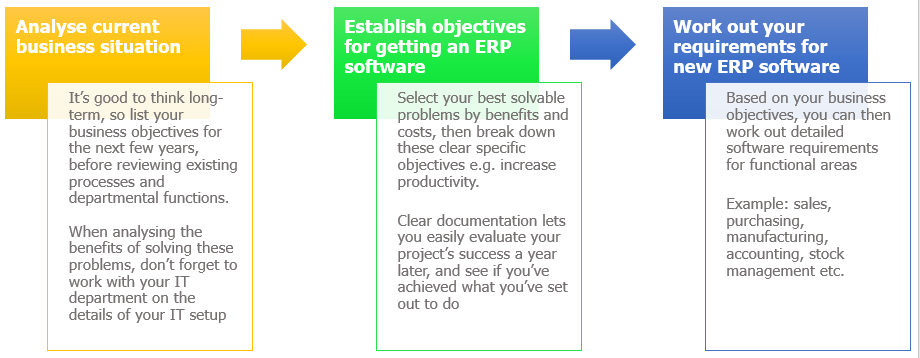Buyers, in their eagerness to get a new ERP software, sometimes make a simple, yet crucial oversight. By focusing their attention primarily on software features, pricing, and accolades, they forget that the software itself is just one part of a larger puzzle.
To avoid the hype trap, we suggest asking yourself a few key questions before you review ERP systems with potential vendors:
#1 Do we have specific expectations of what we want to see during the ERP software demo?
I remember a business owner who once sauntered in for a demo at his office in shorts and slippers, yawning away as if he had just rolled out of bed. To his staff’s mortification, he couldn’t remember what he was viewing, or why his employees called for a software demo in the first place.
Don’t be that guy; your demo session is a great opportunity to see different possible scenarios in the software, and assess what kind of partnership you’ll be in for the long-run. You don’t want to be caught off-guard when you start processing hundreds of thousands (or even millions) of transactions in your new system.
To make the most of it, give your potential vendors specific features, workflows, or functions you expect to see in that session. Did the vendor show they bothered learning about your business? Did they incorporate your ERP goals in the session and ask intelligent questions on how you intend to use the new system, or did they just give you a generic slap-and-paste demo?
By taking a proactive lead, you will save yourself much time and get a clearer understanding of whether this software and partnership will help you achieve your goals.
Which leads to the second point...
#2 How invested is our senior management in the ERP project?
The drive behind a new software search usually begins at the staff level. Repeated inaccuracies and inefficiencies lead to less-than-ideal performance on the ground, which viciously spirals in ever increasing cycles of ineffectiveness.
At some point, the management team decides a new ERP system is in order and delegates the selection process to someone else, stepping in only at the end.
However, companies are more likely to experience a successful ERP software implementation if their senior levels are involved in the process. Research suggests that not only do employees tend to demonstrate greater awareness, interest, and engagement if they know their upper management is involved, their senior executives also play a key role in anticipating and resolving issues that could delay and/or derail the project.
#3 Have we clearly defined our strategic and business objectives? Will the software align with our initiatives?
It’s important to ask the right questions in advance to prevent any unpleasant future surprises. We’ve had clients whose previous ERP software vendors overpromised, under-delivered, and failed to help them evaluate the bigger picture.
The result? Expensive implementation delays that take months to resolve. One client even came close to giving up hope after their project with their ex-vendor stalled for a year (that's a terribly long time to wait).
SEE HOW WE HELPED SMES GAIN NEW PRODUCTIVITY AND REVENUE LEVELS THROUGH ERP SYSTEMS HERE
To avoid being swayed by buzzwords and vendor hype, get your business objectives settled prior to talking to potential vendors. This helps determine the extent and scope of your project before you face a distracting flood of software information.
Here’s a simple flowchart of how a buyer could go about it:
When identifying your objectives in depth, you also need to remember to account for possible additional work needed. While it’s useful having your employees remotely access your ERP system on the road, it may require further investment to ensure your business data stays secure.
#4 Do we already have legacy ERP or accounting systems in place to be concerned about? What's our real risk appetite?
Rapid growth, mergers, and/or acquisition can lead to having more than one legacy or accounting system in place. Some companies also have several software vendors supporting their offices worldwide.
If you’re considering consolidating multiple systems through your new ERP software, you’ll need a software that can standardise business processes across your enterprise.
In addition, you’ll need to consider your upper management's' risk appetite, especially if your legacy systems follow a certain ‘pattern’ of software. With the explosion of new ERP software options, should you go with a proven single vendor suite, or integrate the newest best-in-class packages? Is Cloud ERP the way to go or should you stay with an on-premise solution?
Adopt A Disciplined Approach When Evaluating ERP Software
Choosing a new ERP software goes beyond features, pricing, and accolades. A good approach requires disciplined attention to details, and asking the right questions, like:
- How involved will our upper management be in the process?
- Do we understand precisely what we need and how we’ll measure it?
- What existing legacy systems and risk appetites do we have to contend with?
- Do we have specific objectives we want to get out of software demos?
All said and done, the search for a new ERP software takes into account your company’s current situation, and where you specifically want it to be in the long-run.
If you’re uncertain over which ERP software is suitable for your business, our consultants are always happy to advise you in this area. Just drop us your questions here. Otherwise, head to The Ultimate ERP Systems Guide for SMEs for an in-depth look at commonly asked ERP software questions -- it's free!




